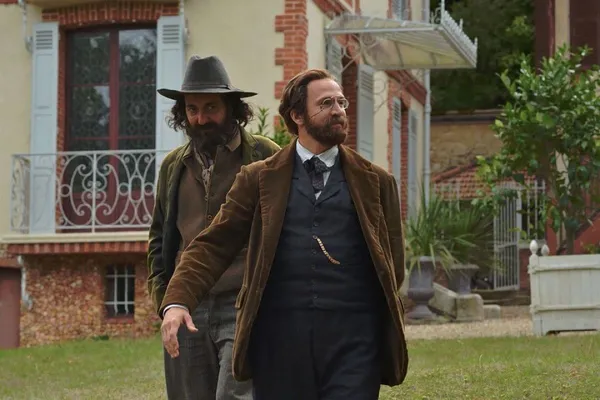 |
| Guillaume Gallienne and Guillaume Canet are Paul Cézanne and Émile Zola in Danièle Thompson's Cézanne Et Moi |
Where else can you find Édouard Manet (Nicolas Gob), Camille Pissarro (Romain Cottard), Guy de Maupassant (Félicien Juttner), Baptistin Baille (Pierre Yvon), Auguste Renoir (Alexandre Kouchner), Ambroise Vollard (Laurent Stocker), Francisco Oller (Pablo Cisneros), Achille Empéraire (Romain Lancry), Père Tanguy (Christian Hecq), Frédéric Bazille (Patrice Tepasso), the great Sabine Azéma as Paul Cézanne's mother, and Glasgow's own Freya Mavor (Joann Sfar's The Lady In The Car With Glasses And A Gun) as the mother to Zola's children - all in one film?
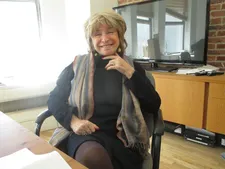 |
| Danièle Thompson on Jean-Marie Dreujou: "He's a wonderful cinematographer." Photo: Anne-Katrin Titze |
Déborah François (of Régis Roinsard's Populaire) is Hortense, Cézanne's wife, Alice Pol is Zola's wife Alexandrine, and his mother Émilie is played by Isabelle Candelier. Back and forth in time we jump, from the South of France to Paris and back with the two great masters of their respective arts.
In one scene Zola and Cézanne are schoolboys forming a bond, in the next they fall for the same woman, compete discussing what artistic creation is, or are at each other's throats for something else. Bathed in seductively beautiful light that makes you want to pack your bags and join them painting in the forest right now, cinematographer Jean-Marie Dreujou's landscape compositions are the backbone of the film.
Rarely in cinema has one man been attacked so much from all angles as Cézanne (Guillaume Gallienne) is here. Guillaume Canet fills his Zola with pungent competitiveness until he reaches a plateau of satisfaction in an openly exposed double life.
Anne-Katrin Titze: Many films about famous writers or painters romanticise. They show them in a way that you would perhaps want to be their friend. You do not do that at all. It was clearly not your idea to romanticize either of them. Not Zola, not Cézanne.
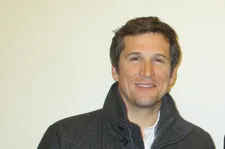 |
| Guillaume Canet at the 20th Anniversary of Rendez-Vous with French Cinema in New York Photo: Anne-Katrin Titze |
Danièle Thompson: That's true. I was really also trying to avoid the biopic aspect. It's not about these two men's lives in general. It's really about their relationship. And how intense and long and actually quite wonderful [it was] and yet they're not made for each other as you would say of a love affair. But they have built something very strong as children.
The fact that the friendship doesn't survive means that actually you lose a piece of your youth. This is why they struggle so much. It is a failure because all their choices are an enemy to the friendship. One is poor and then becomes wealthy and the other is from a rich bourgeois family and will become practically a bum.
AKT: Their ups and downs don't match up at all.
DT: Never, never. One of them admires the other very much, the other will never really appreciate his paintings. Zola writes his best books between the age of 25 and 45, the other one will really find what he is looking for in art in the last 10, 15 years of his life. The letters are incredible. They are so intense, almost like love letters, very passionate letters. Gallimard published a big volume of their letters last September.
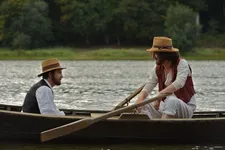 |
| Émile Zola with Paul Cézanne: "The letters are incredible. They are so intense, almost like love letters, very passionate letters." |
AKT: Letters by both men?
DT: Yes, both. I had access to their letters before. You find out so much about both of them. They were beautifully written because they were both very well educated at religious school in Aix [-en- Provence]. It seemed to me a story of - through these two statues that they have become - a way of dealing with how hard friendship is, sometimes even harder than love.
AKT: Something Cézanne is complaining about is that his friend, Zola, is stealing from his life. He is taking something and turning it into something of his own. Did you ever get that accusation? That people said, in your films, you were taking from them?
DT: Well. I wrote many comedies before. I did, for instance, use my daughter for a comedy that was a very successful film, in fact, in many places in the world, called La Boum [The Party], which was Sophie Marceau's first film when she was 13 years old. It was entirely based on my observation of my daughter and her friends.
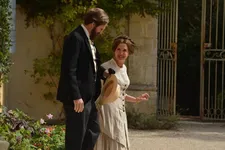 |
| Emile Zola with Cézanne's mother played by Sabine Azéma: "She's a wonderful actress." |
AKT: I remember seeing that.
DT: You remember? I did it. But it was actually charming and so she was actually flattered as a little girl. I mean, she was two years older. And I used also my grandmother in the film, because the character of the grandmother is very important.
AKT: So they didn't complain?
DT: No, they didn't complain. But I used them. I did it. I used them for something more charming and sweet than what Zola did with the character. You probably didn't read the book The Masterpiece [L'Œuvre], because nobody actually did.
AKT: No, Germinal is the only one I read.
DT: It's a very tough book [The Masterpiece]. I had not read the book before I was doing my research. They never saw each other after the publication of the book. This is really basically when they broke up. This is an original screenplay because there is no book about both of them. There are of course many biographies but never together.
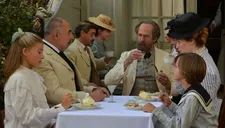 |
| Émile Zola with his children from Jeanne Rozerot (Freya Mavor) |
When you read Zola's book you think, what nerve! It is so close to the real story that you can understand why Cézanne, reading the portrait of his painter who ends up killing himself in front of his canvas…
AKT: He wasn't happy about that.
DT: It was like his friend killing him in a way. And it was so painful for him to feel all their lives that his friend was not admiring him, not admiring his work. He admired Zola very much.
AKT: So many people were not admiring Cézanne. A moment in your film I really liked is with Sabine Azéma when she looks at the painting of the clock. Everything is written on her face at that moment. It's brilliant. My son, Paul Cézanne, is doing this?
DT: She's a wonderful actress. She's very sweet because it's a small part. I'm glad you noticed that. Because she really did it so beautifully. She [Anne-Elisabeth Cézanne, Paul's mother] just doesn't understand.
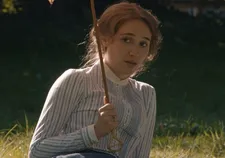 |
| Paul Cézanne's wife Hortense (Déborah François) |
AKT: She wants to like it. And her son is Cézanne! That discrepancy is very funny.
DT: The father doesn't even look at it. But she wants to like it, and she doesn't.
AKT: Another moment, with another great actor in a smaller part, Laurent Stocker [as Ambroise Vollard], accomplishes a lot with a glance.
DT: He plays the one who sold Cézanne paintings, in fact, to Americans. You come to museums in America, there are many more Cézannes here than in Paris, when you go to The Met [The Metropolitan Museum of Art] and to MoMA [Museum of Modern Art] and Chicago. Because Vollard sold the paintings to foreigners. The French didn't want them.
AKT: You show Cézanne being attacked non-stop from all sides. He overhears it, they say it to his face. I loved the end credits. The landscape and the paintings merging.
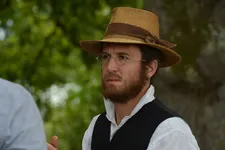 |
| Danièle Thompson on The Masterpiece (L'Œuvre): "When you read Zola's book you think, what nerve!" |
DT: I resisted showing too many of the paintings during the film. Because it's not about the paintings, it's about him. It's not a documentary on Cézanne's work. Or, in fact, Zola's work. It's not about art; it's about artists. Zola never saw the paintings of the last few years.
AKT: The light in your film is beautiful. Tell me about the work with your cinematographer.
DT: Jean-Marie Dreujou, yes. He's a wonderful cinematographer. I showed all my crew, my set designer, my DP, and my costume designer a bunch of paintings. Also some American Impressionists, too. I chose different paintings. One was for one hat, one was for one dress or for one light. I asked Jean-Marie to make a difference between the light of the North and the South because it's a very different thing. That's why so many of the artists loved working in the South.
AKT: The turquoise sky in the South of France!
DT: The light is much colder when we are in Zola's house which is actually Zola's house. The house you see is the real house.
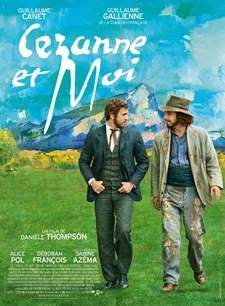 |
| Cézanne Et Moi poster |
AKT: You get that sense. The locations feel real.
DT: They are. And the miracle is that they're intact. Zola's house is now turned into a museum which will open soon. I was allowed by his great-granddaughter to shoot in the garden and in the pantry inside the house. Where Jeanne … Jeanne is the great-grandmother of that woman who is now in her Sixties. It was very touching for the crew to feel - there we are!
AKT: How did Guillaume Canet feel being there?
DT: He was very … There was something very emotional being inside that house.
AKT: Spirit of place.
DT: Oh, yeah. When we shot in the countryside around Aix, I don't know if you've ever been there?
AKT: Yes, I've been there several times.
DT: The cabana is Cézanne's cabana. You walk in and they kept the paint and the pots and pans he used to cook for himself. He would sleep there very often to catch the light of the sundown and sunset. When we walked around with my DP in these landscapes, we were so happy and then we were very lucky with the weather in September. He did a wonderful job.
Coming up - Cézanne Et Moi star Guillaume Gallienne on Paul Cézanne and his relationship to Émile Zola.
Cézanne Et Moi opens in the US on March 31 and in the UK on April 14.





















